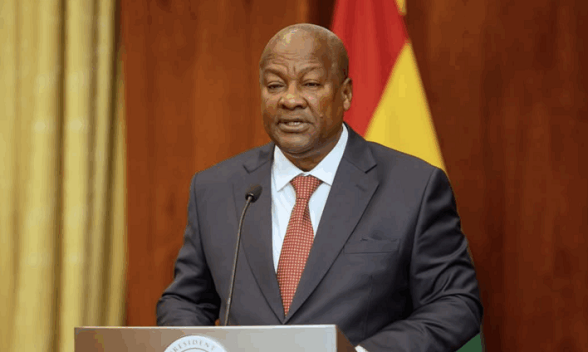Ghana looks forward to leveraging the European Union (EU)-supported Just Energy Transition Partnership (JETP) to scale up solar, wind, and green hydrogen financing, President John Dramani Mahama has stated.
JETPs are initiatives designed to help countries accelerate their transition away from fossil fuels, particularly coal, while ensuring a just and equitable shift for affected communities and workers.
These partnerships involve international cooperation and financial support to mobilise investments for renewable energy development, energy efficiency, and other low-carbon technologies.
Speaking at the 2025 Ghana-EU Partnership Dialogue in Accra, President Mahama said Ghana’s Energy Transition and Investment Plan, launched in 2023, reaffirmed their commitment to achieving net-zero emissions by the year 2060.
He said Ghana was pursuing a diversified mix of renewable energy, natural gas, and potentially nuclear power to ensure energy security while reducing its overall carbon footprint.
He said that with Ghana’s rich lithium and graphite deposits, they were positioning themselves as a centre for electric vehicle assembly and battery manufacturing in West Africa.
“We also appreciate the EU’s backing for our Sustainable Cities Programme, especially in the northern regions of our country,” he said.
President Mahama said this €14.7 million initiative was helping transform Tamale, Bogatanga, Wa, and other regional capitals into innovative, inclusive, and climate-resilient urban spaces.
On natural resource governance and environmental protection, the President said Ghana was proud to be the first African country to issue an FLEGT (Forest Law Enforcement Governance and Trade License), reinforcing their legal and sustainable forestry leadership.
With regards to the fisheries sector, the President said: “We are also finalising for co-traceability mechanisms and reforming the Fisheries Act to lift the EU Yellow Card.”
He said these efforts reflect theirr commitment to sustainable trade, environmental stewardship, and compliance with international standards.
Concerning global governance and structural reform, the President said the current global order defined by outdated institutions and an inequitable financial framework requires urgent reform.
He said the UN Security Council must evolve to reflect contemporary realities; and that similarly, the global financial architecture must ensure fairer access to capital, reform credit rating practices, and inclusive debt solutions for developing countries.
President Mahama reiterated that Ghana stands with the EU in calling for a more just and representative international system that gives all nations an equal voice and opportunity, regardless of size or economic might.
He said the Accra Dialogue presents a unique opportunity to assess their progress and chart the course ahead.
He noted that their agenda covers critical economic cooperation, peace, security, governance, migration, and sustainability themes.
He urged participants at the Dialogue to approach these discussions with clarity, with openness, and a shared resolve to translate dialogue into action.
The President said the partnership between Ghana and the EU was not just enduring; declaring that, “it is evolving”.
“Let us continue to build a fairer, greener, more secure, and more prosperous future for all of us,” he stated.
Mr. Irchad Razaaly, the EU Ambassador to Ghana, said the EU and Ghana share a steadfast commitment to effective multilateralism, and that they all know what it means today, a rules-based international order.
“I would like to acknowledge the constructive role that Ghana has played at the UN Security Council during its time and as a current member of the Human Rights Council,” he said.
“I would like to acknowledge as well Ghana’s unwavering support to increase territorial integrity and sovereignty in the face of the racial migration.”
Mr. Samuel Okudzeto Ablakwa, the Minister of Foreign Affairs, said their cooperation on climate action and green growth must be accelerated to meet the ambitious targets set under the Paris Agreement and the UN Sustainable Development Goals.
He said Ghana’s strategic initiatives in renewable energy and environmental conservation were bolstered by EU support.
He noted that Ghana needs the EU’s further support to unlock climate and green funds, as well as funding from the carbon market to enhance our growth and environmental sustainability.
GNA





